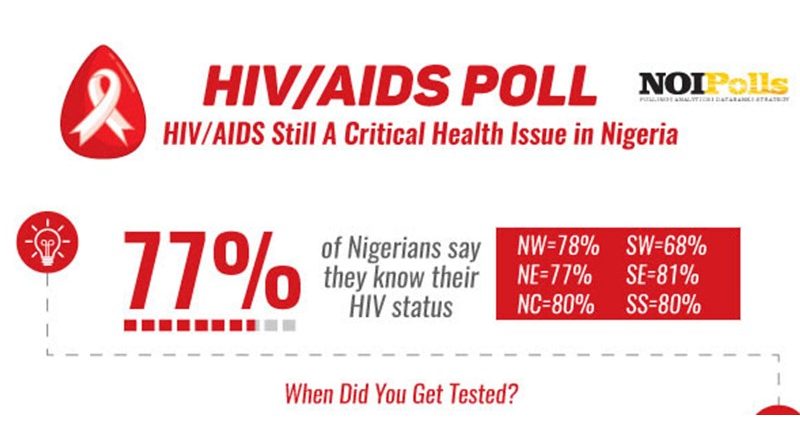HIV/AIDS Is Still Prevalent In Nigeria – New Poll Reveals
The World AIDS day was observed on December 1st, 2019. The aim of this yearly event is to create awareness for people around the world to unite and show support for people living with Human Immunodeficiency Virus (HIV) and to remember those who have died from AIDS-related illnesses. According to a report from the Joint United Nations Programme on HIV and AIDS (UNAIDS), there were approximately 37.9 million people worldwide with HIV/AIDS in 2018. Of these, 36.2 million were adults and 1.7 million were children below 15 years, although the burden of the epidemic continues to vary considerably between countries and regions.[1] Nigeria is not excluded as reports have revealed that we have the second highest burden of HIV infection in the world with an estimate of 1.9 million people living with HIV and AIDS.[2]
In commemoration of the World AIDS Day, NOIPolls conducted a public opinion poll on HIV/AIDS in Nigeria. The poll gauged the perception of Nigerians regarding its prevalence, their current HIV status, mode of transmission of HIV as well as discrimination against people living with the HIV. The poll result revealed that HIV/AIDS is still prevalent in the country as stated by 65 percent of Nigerians and analysis on age-group showed that Nigerians aged 18 – 35 years make up the highest percent of Nigerians with this perception.
One of the most important ways to reduce the spread of HIV is to be tested for it and it should be considered as a routine part of preventive care. Interestingly, 77 percent of Nigerians claimed that they know their HIV status and this assertion cuts across gender, geo-political zone and age-group with at least 68 percent representation. However, it is rather worrisome to note that while 23 percent of Nigerians reported that they do not know their HIV status, 31 percent of those that claimed to know their status last had a test over a year ago.
With regards to mode of transmission, the poll showed that most Nigerians are aware of the common modes of contracting HIV/AIDS as 68 percent cited unprotected sexual intercourse. Also, awareness on mother to child prevention is relatively high amongst Nigerians as 70 percent believe that mother to child transmission can be prevented if proper medication is taken.
Furthermore, despite the 2014 HIV/AIDS Anti-Discrimination Act which was signed into law to protect the rights and dignity of people living with HIV, it is worrisome to note that 40 percent of Nigerians still believe that Nigerians living with HIV are being discriminated against. Given the above findings from the poll, encouraging HIV testing among Nigerians to ensure everyone knows their HIV status is key to any informed strategic plan. Without knowing the proportion of Nigerians that are living with HIV, it is hard to mitigate new infections and provide HIV treatment to all. Therefore, it is important that the government and other relevant stakeholders ensure that as many people as possible get tested and that treatment is made available for those who have tested positive to the virus. These are some of the key findings from the HIV/AIDS Poll conducted in the week commencing 18th November, 2019.
Background
The International Day to commemorate the World AIDS Day is an annual event to sensitize the world on the issues surrounding AIDS. This year particularly recognizes the essential role communities have played and continues to play in addressing the issues surrounding AIDS.
As at the end of 2018, there are 37.9 million people living with AIDS globally.[3] Nigeria witnessed its first AIDS case in 1985 where the victim was a 13-year-old sex worker. Ever since then, the numbers have significantly been on the rising increase and statistics have shown that Nigeria has the second largest HIV epidemic in the world with 1.9 million people known to be living with the disease. According to the National Strategic Framework on HIV and AIDS, six states in Nigeria account for 41% of people living with HIV including Kaduna, Akwa Ibom, Benue, Lagos, Oyo and Kano. HIV prevalence is highest in the South-South region which stands at a 5.5%, but with a 1.8% prevalence in the South East. According to the report, there are higher rates of HIV in rural areas than in urban regions.[4]

The theme for this year’s celebration is “Communities make the difference”.[5] There are different people like Peer Educators, Community health workers, Grass-root activists, Door-to-Door service providers and counsellors that make up the community. These people’s role in driving change, delivering services, advocating against the barriers that inhibit access to treatment and support for all cannot be overemphasized as they help to foster an all-inclusive nation without discrimination. This year’s theme seeks to recognize their impact as well as their struggles. In light of this, NOIPolls has conducted a public opinion poll to access the perception of Nigerians regarding HIV/AIDS.
Survey Findings
The first question sought to gauge the perception of HIV/AIDS prevalence in Nigeria, and findings indicted that the incidence of HIV/Aids is prevalent in the country. This was stated by 65 percent of the respondents interviewed. Analysis by age-group showed that those aged 18 – 35 years make up the highest proportion of Nigerians with this perception. It is important to note that 53 percent of respondents from the North West do not think that HIV/AIDS is prevalent in Nigeria.

One of the most important ways to reduce the spread of the Human Immunodeficiency Virus (HIV) is to be tested for it and it should be considered as a routine part of preventive care. Given the above, 77 percent of Nigerians interviewed claimed that they know their HIV status and this assertion largely cuts across gender, geo-political zone and age-group. It is rather worrisome to note that 23 percent of Nigerians reported that they do not know their HIV status.
Of the proportion who know their HIV status, 57 percent acknowledged that they had last conducted a test on HIV at least 6 months (or more) ago. This means a larger proportion of those who claimed to know their status have not checked their status within the past 6 months. Respondents from the South East zone had the highest proportion of residents whose HIV test was older than 6 months.


Furthermore, 71 percent of the respondents revealed that they did their HIV test in a public health facility, while 27 percent disclosed it was conducted at a private health facility, amongst other facilities.

With regards to mode of transmission, the poll result revealed that the most popular means of transmission of HIV/AIDS was through unprotected sexual intercourse as reported by 81 percent of respondents. 27 percent of respondents also indicated Sharing of needles and sharp objects as a means of transmitting HIV/AIDS.

With regards to awareness of testing centres, a larger share of Nigerians acknowledged that they know where they can go and get tested for HIV in their locality however, 32 percent disclosed they were unaware. Across geo-political zones, North West had the highest proportion of respondents who were not aware of where to get tested at 44 percent followed by South West at 36 percent.

An overwhelming majority (92 percent) of Nigerians stated that HIV/AIDS cannot be cured, and this response cuts across all demographics. Only 8 percent claimed that HIV/AIDS can be cured.
Of the small proportion who believe it can be cured, a greater number of them (45 percent) believe that HIV/AIDS can be cured by the use of herbal medicine.

Knowledge of mother to child transmission revealed that most respondents believe that pregnant women who are HIV positive can give birth to children who are HIV negative. Of this proportion, 48 percent of the respondents said it is possible if expectant mothers take their medications religiously.

The HIV/AIDS Anti-Discrimination Act 2014 was signed into law to protect the rights and dignity of people living with HIV therefore making it illegal to discriminate against people based on their HIV status. It also prohibits any employer, individual or organization from requiring a person to take an HIV test as a precondition for employment or access to services. However, it is worrisome to note that 40 percent of Nigerians still believe that Nigerians living with HIV are being discriminated against regardless of the 2014 HIV/AIDS Anti-Discrimination Act.

In conclusion, the poll findings have shown that HIV/AIDS is prevalent and most Nigerians are aware of the common modes of contracting HIV/AIDS as 68 percent cited unprotected sexual intercourse. It is worthy to note that Nigeria’s response to HIV/AIDS is guided by the National Strategic Framework 2017–2021, hence government and other stakeholders should mainly focus on ending AIDS by achieving zero new infections rate, zero AIDS related deaths, zero discrimination against people living with HIV/AIDS and elimination of mother-to-child transmission.
It is challenging to deal with HIV epidemic without access to treatment; thus, considerable commitment, funding and resources need to be expended to expand access to treatment as a tool for both managing people living with HIV and as preventive method as well. For instance, providing anti-retroviral treatment for Nigerians living with HIV doesn’t only benefit those already living with HIV, it will also reduce the chance of onward transmission to other Nigerians.
In commemoration of the World AIDS day, it is essential to engage all members of the society, especially those who are most vulnerable to HIV, to a unified HIV response. Finally, HIV testing should be greatly encouraged among the Nigerians to ensure everyone knows their HIV status, because it is difficult to reduce new infections and provide HIV treatment to all without knowing the figure of Nigerians living with the virus.
Survey Methods
The opinion poll was conducted in the week commencing November 18th, 2019. It involved telephone interviews of a proportionate nationwide sample of 1,000 randomly selected phone-owning Nigerians aged 18 years and above, representing the six geo-political regions and 36 states and the FCT of the country. Interviews were conducted in 5 languages – Igbo, Hausa, Yoruba, Pidgin English and English. Although we can say with 95% confidence that the results obtained were statistically precise – within a margin of error of plus or minus 4.65%; we recognize that the exclusive use of telephone polling has its limitation of excluding non-phone-owning Nigerians. Nonetheless, with the country’s teledensity put over 100 percent by the Nigerian Communications Commission (NCC), we consider our telephone polling approach appropriate. Also, given the rigorous scientific process of randomization and stratification applied, we can confidently stand by the validity of our methodology and approach. NOIPolls Limited, No. 1 for country specific polling services in West Africa. We conduct periodic opinion polls and studies on various socio-economic and political issues in Nigeria. More information is available at www.noi-polls.com.
Disclaimer
This press release has been produced by NOIPolls Limited to provide information on all issues which form the subject matter of the document. Kindly note that while we are willing to share results from our polls with the general public, we only request that NOIPolls be acknowledged as author whenever and wherever our poll results are used, cited or published. NOIPolls hereby certifies that all the views expressed in this document accurately reflect its views of respondents surveyed for the poll, and background information is based on information from various sources that it believes are reliable; however, no representation is made that it is accurate or complete. Whilst reasonable care has been taken in preparing this document, no responsibility or liability is accepted for errors or fact or for any views expressed herein by NOIPolls for actions taken as a result of information provided in this report. Any ratings, forecasts, estimates, opinions or views herein constitute a judgment as at the date of this document. If the date of this document is not current, the views and content may not reflect NOIPolls’ current findings and/or thinking.
NOIPOLLS




